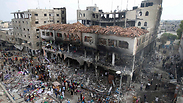
Importance of media balance on Gaza war
Op-ed: While parts of mainstream media in Britain learned lessons from previous conflicts and offered a more mature coverage, many sent correspondents to Gaza to focus on emotional stories.
It was a difficult summer for Israel, first and foremost for the majority of Israel's population, which found itself running for shelter on a daily basis for weeks on end, as thousands of Hamas rockets, some Iranian-made, were launched from Gaza.
Meanwhile in the UK, demonstrations against Israel often saw the participation of protesters who openly supported Hamas and compared Israel to Hitler's Nazi Germany, unabashedly spurting vitriolic hatred. One woman was videotaped during a protest saying "Israel is the most evil country in the world", while another said Israel was surely "the anti-Christ". At the same time, anti-Semitism reached unprecedented levels, with over 300 incidents recorded by the UK's Jewish Community Security Trust in July alone.
Looking at the media's role in shaping UK public opinion, a few patterns emerge: Coverage of the conflict by parts of the mainstream media was more mature than in the past; clearly lessons were learned and steps taken to avoid some of the usual pitfalls.
BBC Trending posted a strong video-piece pointing to the use of fake photographs supposedly from Gaza but in fact not from Gaza at all, but Iraq, Syria or elsewhere; another article detailed the low reliability of statistics on civilian casualty rates coming out of Gaza.
The main outlets positioned their correspondents inside Gaza as well as in Israel's south, reporting on rocket fire and visiting the Hamas tunnels as they were exposed on the Israeli side by the IDF.
Israel's case was further strengthened by the realization in significant parts of the media that the challenge posed by radical Islamist groups was not unique to Israel, and in fact was being faced by the UK itself, both in Syria and Iraq, and as a national security issue in the context of European jihadists returning home to pursue their terrorist aspirations.
Meanwhile, anti-Israel activists were outraged at what they perceived as a pro-Israel bias, demonstrating outside BBC offices, and holding meetings in which they repeated the classic age-old tales of Israel's (in continuation of the Jews') mythic "control of the media".
As the conflict continued, the no-doubt tragic civilian toll in Gaza was given enormous attention in the media, with coverage that can only be termed as "emotional". Photographs of Palestinian civilians covered the pages of The Guardian and the Independent for days on end, often accompanied by headlines such as "Doomsday". A Sky commentator went as far as to place Israel's actions in the context of the allied bombing of Dresden and the nuclear attacks on Hiroshima and Nakasaki, while another journalist expressed his "inability to write objectively" on Gaza, and wondered if just as there are "just wars", perhaps there is also "just terrorism".
This type of coverage, and these analogies were somehow not felt to be necessary in previous months, as the civilian death toll in Syria and Iraq continued to rise at its steady, murderous rate.
A parallel war was taking place on Twitter, where some journalists in Gaza surely endangered their lives by reporting on Hamas rockets being fired from civilian areas, including hospitals, schools and UN compounds, while most focused nearly exclusively on the humanitarian narrative, which though valid and necessary, all but ignored the presence of Hamas, which was harder to find and probably more dangerous to investigate. Others still, outside Gaza, such as SKY Arabia's Jessy El-Murr, chose to fill their Twitter feeds with never-ending diatribes of pernicious hatred, repeatedly equating Israel with the Nazi regime.
As the dust settles and the media's news cycle migrates to new issues, it's worthwhile to adopt a modest outlook when trying to understand how this type of coverage influences, if at all, prospects for peace.
For at the end of the day, a narrow, often demonizing international portrayal of Israel has little bearing on most Israelis. Those who support living in peace alongside a neighboring Palestinian state, and polls place them in the majority, are doing so for themselves and for their children, not to placate left-wing Europeans.
But the message that they are receiving is that Israel is not seen as legitimate, that it will continue to be picked upon no matter what, and that it will always have to fend for itself, by itself. Those who expect Israel to take the huge risks that it must in order to achieve peace, should consider that supporting Israel, offering positive incentives instead of threats and rebukes, may be a better course of action.
This analogy holds true not only for Governments and NGOs, but for the media as well; a real choice is there to be made, between seizing every opportunity to portray Israel as a dark and undemocratic place, and choosing to highlight the cooperation, the common goals and the joint ventures that are often shared between the countries of the region; Syrians treated in Israeli hospitals, a gas deal signed with Jordan, or the work of dozens of NGOs in advancing human rights, coexistence and peace.
With all its flaws, Israel is by far the most stable, democratic, human-rights oriented society in the region, one that shares the values of the European continent which nearly annihilated its people and which played a key role in its creation. The media can and should play an important role by engaging and promoting understanding, rather than remaining on the (sterile) moral high ground, expressing selective disdain at the imperfect reality that is the Middle East.
Yiftah Curiel is the spokesperson of the Israeli Embassy, London.










